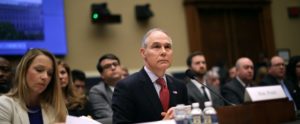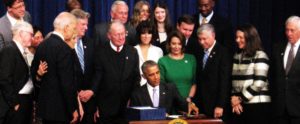 Volume 392, Number 10144
Volume 392, Number 10144
28 July 2018
WORLD REPORT If confirmed, Kavanaugh could tilt the court toward the president’s views on US public health policy. Susan Jaffe, The Lancet‘s Washington correspondent, reports.

…
 Volume 392, Number 10144
Volume 392, Number 10144
28 July 2018
WORLD REPORT If confirmed, Kavanaugh could tilt the court toward the president’s views on US public health policy. Susan Jaffe, The Lancet‘s Washington correspondent, reports.

…
Susan Jaffe | Washington Correspondent for The Lancet | 10th July 2018
After winning a federal court decision to stop Kentucky from requiring some Medicaid patients find paid or volunteer work to keep their coverage, beneficiary advocates are considering legal challenges to stop similar efforts in other states.
![]() The victory may expose a major flaw in the Trump Administration’s effort to reshape the Medicaid program, advocates say. But others claim the flaw is in the court decision. [Continued here.]…
The victory may expose a major flaw in the Trump Administration’s effort to reshape the Medicaid program, advocates say. But others claim the flaw is in the court decision. [Continued here.]…
 Volume 391, Number 10139
Volume 391, Number 10139
23 June 2018
WORLD REPORT Months after the Trump Administration said that there is no ban on gun violence studies, the CDC still lacks the funding to proceed. Susan Jaffe, The Lancet‘s Washington correspondent, reports.
…Appeals for immediate federal action to make schools and communities safer have so far largely gone unanswered. And legislative efforts languish in Congress, as the chairman of a key congressional committee that oversees federal health programmes has so far resisted requests by its Democratic members to hold hearings on preventing gun violence [continued here].…
 Volume 391, Number 10136
Volume 391, Number 10136
2 June 2018
WORLD REPORT The president’s wide-ranging plan to reduce prescription drug prices won’t be easy to achieve, experts say. Susan Jaffe, The Lancet’s Washington correspondent, reports.
“We will have tougher negotiation, more competition, and much lower prices at the pharmacy counter. And it will start to take effect very soon“, said President Donald Trump.
How soon will depend on what steps the administration takes on its own, through regulations and other mandates, and what changes can only be achieved through new laws enacted by Congress, which will increasingly be preoccupied by November’s election. [Continued here.]…
Susan Jaffe | Washington Correspondent for The Lancet | 8th May 2018
![]() At last count, at least four federal agencies were conducting nearly a dozen investigations of Environmental Protection Agency chief Scott Pruitt, probing his office renovations, a round-the-clock security unit who accompanied him on a trip to Disneyland, personnel management, and first-class air travel. The Capitol Hill condo he rented at a bargain rate of only $50 a night from the wife of an energy industry lobbyist has also come under scrutiny.
At last count, at least four federal agencies were conducting nearly a dozen investigations of Environmental Protection Agency chief Scott Pruitt, probing his office renovations, a round-the-clock security unit who accompanied him on a trip to Disneyland, personnel management, and first-class air travel. The Capitol Hill condo he rented at a bargain rate of only $50 a night from the wife of an energy industry lobbyist has also come under scrutiny.

Environmental Protection Agency Administrator Scott Pruitt testifies at a congressional hearing April 26, 2018 (Getty Images).
But in separate hearings held by the congressional subcommittees that oversee EPA, Pruitt dismissed the investigations as politically motivated.
“Those who attack the EPA and attack me are doing so because they want to attack and derail the president’s agenda and undermine this administration’s priorities,” Pruitt told the congressional panels two weeks ago. “I am simply not going to let that happen.”
…Republicans were eager to praise his achievements during the hearings, and encouraged him to keep at it. [Continued here] …
 Volume 391, Number 10131
Volume 391, Number 10131
28 April 2018
WORLD REPORT Frustrated by what they say is the US Government’s disregard for science, more scientists and physicians are entering politics. Susan Jaffe, The Lancet’s Washington correspondent, reports.

Nuclear engineer Elaine Luria running for Congress in southeast Virginia (photo/elaineforcongress.com)
Scientists, physicians, engineers, and their supporters surprised many people—and maybe themselves—when they assembled in cities across the USA a year ago demanding an end to President Donald Trump’s Administration’s so-called war on science, which has attacked climate change, environmental protection laws, and funds for biomedical research, among other targets.
But, for some critics, protests are not enough. Instead of appealing to elected officials, now they want to take their place.
“…More and more scientists realise that they have… an obligation to see that the idea of science is defended, that evidence is respected, and that the conditions for science to thrive are respected”, said Rush Holt, chief executive officer of the American Association for the Advancement of Science. [Continued here.] …
Susan Jaffe | Washington Correspondent for The Lancet | 28th March 2018
![]() A day after the horrific mass shooting at Marjory Stoneman Douglas High School in Parkland, Florida on February 14, where 17 students and faculty were murdered and 14 injured, Health and Human Services Secretary Alex Azar fielded budget questions from a congressional committee. In response to Representative Kathy Castor, a Democrat from Tampa, Florida, Azar said there is no restriction on the ability of the Centers for Disease Control and Prevention (CDC) to conduct research into the causes of gun violence.
A day after the horrific mass shooting at Marjory Stoneman Douglas High School in Parkland, Florida on February 14, where 17 students and faculty were murdered and 14 injured, Health and Human Services Secretary Alex Azar fielded budget questions from a congressional committee. In response to Representative Kathy Castor, a Democrat from Tampa, Florida, Azar said there is no restriction on the ability of the Centers for Disease Control and Prevention (CDC) to conduct research into the causes of gun violence.
Questions about CDC’s ability to investigate gun violence—as it

“March for Our Lives” rally in Washington, D. C. March 24, 2018. (Photo/Susan Jaffe)
would other public health threats—have persisted ever since Congress passed the 1996 Dickey Amendment prohibiting the use of research funds to advocate or promote gun control.
“We don’t believe that it gets in the way of our ability to do violence research or firearms violence research at any part of HHS,” Azar told another congressional panel a month later. “I think we’ve now made it quite publicly—and within the administration—clear that we don’t see any barriers around violence or firearm violence research. We’re in the evidence and science-gathering business.”
His assurances were also included in the instructions that accompanied the budget agreement Congress approved and President Donald Trump signed into law last week. While some observers believe this means CDC has permission from Congress to proceed, some leading experts in firearms research are skeptical. There may be no barriers, but they say there’s no funding either.[Continued here] …
 Volume 391, Number 10126
Volume 391, Number 10126
WORLD REPORT Medicaid work requirements would make the health insurance programme a pathway out of poverty, say top US health officials. Susan Jaffe, The Lancet’s Washington correspondent, reports.
Beneficiaries can lose their health care if they fail to pay a premium, submit documentation that they qualify for an exemption, or to report a change in eligibility. “All roads lead to people being terminated from the programme or locked out of coverage,” said Leonardo Cuello, an attorney and director of health policy at the National Health Law Program in Washington, DC.
“This is not about punishing anyone”, said Arkansas Governor Asa Hutchinson. “It’s about giving people an opportunity to work and give them the training they need and help them move out of poverty and up the economic ladder.” [Full article here.] …
 Volume 391, Number 10121
Volume 391, Number 10121
WORLD REPORT The CDC has indicated it will reduce its foreign presence, and proposed budget cuts make some fear its core functions are threatened. Susan Jaffe, The Lancet’s Washington correspondent, reports.
“We don’t know what the next outbreak organism will be; we don’t know where it will come from, or when it will emerge”, [former CDC director Dr. Tom] Frieden said. “But we are 100% certain there will be a next one and if we are not better prepared than we were during Ebola, shame on us.” [Full article here.]
…
Susan Jaffe | Washington Correspondent for The Lancet | 22nd January 2018
![]() On the first anniversary of Donald Trump’s inauguration as the 45th
On the first anniversary of Donald Trump’s inauguration as the 45th  president of the United States on January 20, 2018, the federal government ground to a shutdown and hundreds of thousands of women and their supporters rallied against the new president in dozens of cities across the country. [Continued here.]
president of the United States on January 20, 2018, the federal government ground to a shutdown and hundreds of thousands of women and their supporters rallied against the new president in dozens of cities across the country. [Continued here.]
…
Susan Jaffe | Washington Correspondent for The Lancet | 27th December 2017
 Volume 390, Number 10108
Volume 390, Number 10108
WORLD REPORT As the Presidential Commission releases its recommendations, Trump moves closer to defining his policies against the opioid epidemic Susan Jaffe, The Lancet’s Washington correspondent, reports.
“Having failed to recognise how this epidemic was going to grow in proportion and take vigorous enough action, we need to be willing to be far more vigorous so we don’t continue with that mistake,” said Food and Drug Administration Commissioner Scott Gottlieb. [full story here]
…
[UPDATE: Since this article was published, Medicare officials extended the deadline for applying for an exemption to the Part B late enrollment penalty to Sept. 30, 2018. The announcement came in a fact sheet posted on Oct. 12, 2017.]
Many older Americans who have Affordable Care Act insurance policies are going to miss a Sept. 30 deadline to enroll in Medicare, and they need more time to make the change, advocates say.
A lifetime of late enrollment penalties typically await people who don’t sign up for Medicare Part B — which covers doctor visits and other outpatient services — when they first become eligible. That includes people who mistakenly thought that because they had insurance through the ACA marketplaces, they didn’t need to enroll in Medicare.

Medicare officials are offering to waive those penalties under a temporary rule change that began earlier this year, but the deal ends Sept. 30.
On Wednesday, more than 40 groups, including consumer health advocacy organizations and insurers, asked Medicare chief Seema Verma to extend the waiver deadline through at least Dec. 31, because they are worried that many people who could be helped still don’t know about it. [Continued at Kaiser Health News and NPR]…
 Volume 390, Number 10099
Volume 390, Number 10099WORLD REPORT As Congress considers how to fund the government next year, scientists hope spending for research will not be curtailed. Susan Jaffe, The Lancet’s Washington correspondent, reports.
The dramatic defeat of the Republicans’ Affordable Care Act (ACA) repeal legislation still looms over the US Capitol as Congress reconvenes this month for more tough decisions, including many that will affect health and science research programmes. …The prospects for science funding will depend on competing budget pressures and political fissures. “There are a lot of moving parts and a lot of uncertainty”, said Matt Hourihan, at the American Association for the Advancement of Science. “And while a spending deal [agreement] is certainly possible, it’s hard to see how they get there from here.” [Continued here]…
 Volume 389, Number 10088
Volume 389, Number 10088WORLD REPORT Slow appointments and vacant positions in federal agencies challenge the stability of research in the USA. Susan Jaffe, The Lancet’s Washington correspondent, reports.
As President Donald Trump rolls out his domestic agenda, his proposed budget cuts and lingering vacancies in key federal agencies have rattled some people in the biomedical research and science community.
“This has been the most anxious time in science that I have seen in this country”, said Rush Holt, chief operating officer at the American Association for the Advancement of Science (AAAS), which represents 250 scientific societies and academies serving 10 million members. Holt cited a litany of reasons: “fake news” that distorts science, “policy making based on wishful thinking rather than evidence, funding proposals that are nonsensical, and unfilled positions in government agencies”. [Continued here]
…
[UPDATE: Since this article was published, Medicare officials extended the deadline for applying for an exemption to the Part B late enrollment penalty to Sept. 30, 2018. The announcement came in a fact sheet posted on Oct. 12, 2017.]
Each year, thousands of Americans miss their deadline to enroll in Medicare, and federal officials and consumer advocates worry that many of them mistakenly think they don’t need to sign up because they have purchased insurance on the health law’s marketplaces. That decision can leave them facing a lifetime of enrollment penalties.
Now Medicare has temporarily changed its rules to offer a reprieve from penalties for people who kept Affordable Care Act policies after becoming eligible for Medicare.
“Many of these individuals did not receive the information necessary [when they became eligible for Medicare or when they initially enrolled] in coverage through the marketplace to make an informed decision regarding” Medicare enrollment, said a Medicare spokesman, explaining the policy change.
Those who qualify include people 65 and older who have a marketplace plan or had one they lost or canceled, as well as people who have qualified for Medicare due to a disability but chose to use marketplace plans. They have until Sept. 30 to request a waiver of the usual penalty Medicare assesses when people delay signing up for Medicare’s Part B, which covers visits to the doctor and other outpatient care…
as people who have qualified for Medicare due to a disability but chose to use marketplace plans. They have until Sept. 30 to request a waiver of the usual penalty Medicare assesses when people delay signing up for Medicare’s Part B, which covers visits to the doctor and other outpatient care…
“This has been a problem from the beginning of the Affordable Care Act, because the government didn’t understand that people would not know when they needed to sign up for Medicare,” said Bonnie Burns, a consultant for California Health Advocates, a consumer group. “Once they had insurance, that relieved all the stress of not having coverage and then when they became eligible for Medicare, nobody told them to make that change.”[Continued at Kaiser Health News and NPR]…
27 May 2017
WORLD REPORT Scott Gottlieb becomes commissioner of the FDA, as the agency’s role is threatened by an administration adverse to regulation. Susan Jaffe, The Lancet’s Washington correspondent, reports.
Only 6 months ago, Scott Gottlieb was still a resident fellow at the American Enterprise Institute, a co nservative thinktank, when he presented testimony to a US Senate committee investigating prescription drug prices. Before he began, he volunteered that he was “a reformed government bureaucrat, having worked at FDA [US Food and Drug Administration] for a number of years”. He blamed astonishing price hikes—500% in the case of Mylan’s EpiPen—on “regulatory failures stemming from FDA policy, and I think that policy can be fixed”.
nservative thinktank, when he presented testimony to a US Senate committee investigating prescription drug prices. Before he began, he volunteered that he was “a reformed government bureaucrat, having worked at FDA [US Food and Drug Administration] for a number of years”. He blamed astonishing price hikes—500% in the case of Mylan’s EpiPen—on “regulatory failures stemming from FDA policy, and I think that policy can be fixed”.
Gottlieb was sworn in as the 23rd commissioner of the FDA after being approved earlier this month by the US Senate, over the strong objections of most Democrats. Now Gottlieb will have a chance to fix a daunting array of policies. [Continued here] …
29 April 2017
WORLD REPORT Americans push back against President Trump’s proposed budget cuts… Susan Jaffe, The Lancet’s Washington correspondent, reports.
President Donald Trump is famous for his early morning Tweets and off-the-cuff remarks that can sometimes be puzzling. But what he thinks about biomedical research and basic science is quite clear in his first proposed budget for running the federal government.

March for Science, Washington, D.C. / Susan Jaffe
Trump’s America First: A Budget Blueprint to Make America Great Again outlines a $1·1 trillion spending plan that would take effect when the new fiscal year begins in October. The president wants to move $54 billion from domestic agencies to fortify the US military. To help pay for the transfer, he is proposing funding cuts for the US Environmental Protection Agency (EPA; 31%) and the National Institutes of Health (NIH; 18%) [and other domestic agencies]….
To squeeze $5·8 billion out of the agency’s $30·3 billion budget, the Trump administration would reorganise NIH’s 27 institutes and centres and “rebalance federal contributions to research funding” according to the budget blueprint. …Health and Human Services Secretary Tom Price told a congressional committee last month that the NIH could operate on a tighter budget by cutting the roughly 30% of grant money that pays for indirect research costs. These expenses can include rent, utilities, administrative staff, and equipment. “That money goes for something other than the research that’s being done”, Price said.
Price’s suggestion was especially disturbing coming from the person who is responsible for overseeing the NIH, said Harold Varmus, who directed the NIH in the 1990s and headed the National Cancer Institute at NIH for 5 years until 2015. “You can’t do research in the dark”, he said. “You can’t do research—at least my kind of research—without a building and without electricity and water and administrative expenses”. [Continued here]
…
25 March 2017
WORLD REPORT The Trump administration’s proposed budget makes large cuts to the US Environmental Protection Agency. Susan Jaffe, The Lancet’s Washington correspondent, reports.
As Oklahoma Attorney General, Scott Pruitt represented his state in more than a dozen lawsuits challenging the US Environmental Protection Agency’s (EPA) efforts to limit air and water pollution. Several cases sought to block President Barack Obama’s Clean Power Plan aimed at reducing the greenhouse gas emissions from coal plants linked to climate change.
…Less than a year later, Pruitt and his opponents have switched sides. President Donald Trump appointed Pruitt to lead the EPA and now those opponents accuse the Trump administration of federal overreach by seeking to undermine key environmental laws.
The administration has already taken steps to begin rolling back some environmental rules issued by the EPA under President Barack Obama (panel). And last week, Trump unveiled his proposed federal budget, which reduces federal non-defence spending by US$54 billion, including a 31% ($2·6 billion) cut in EPA funding—more than any other domestic agency. [Continued here] …
How future funding for the landmark 21st Century Cures Act and repeal of the Affordable Care Act may affect its success. [Interviews with lead sponsors Representatives Fred Upton, Diana DeGette, NIH Director Francis Collins, and patient advocates. Full article here] …
By Susan Jaffe | Kaiser Health News | December 14, 2016 | This KHN story also ran on ![]()
When Cindy Hunter received her Medicare card in the mail last spring, she said she “didn’t know a lot about Medicare.” She and her husband, retired teachers who live in a Philadelphia suburb, decided she didn’t need it because she shared his retiree health insurance, which covered her treatment for ovarian cancer.

Cindy Hunter, who is battling ovarian cancer, says she mistakenly thought she didn’t need to enroll in Medicare because her husband’s retiree insurance would cover her. (Steph Brecht/Courtesy of Cindy Hunter)
“We were so thankful we had good insurance,” she said. So she sent back the card, telling officials she would keep Medicare Part A, which is free for most older or disabled Americans and covers hospitalization, some nursing home stays and home health care. But she turned down Part B, which covers doctor visits and other outpatient care and comes with a monthly premium charge. A new Medicare card arrived that says she only has Part A.
Her story isn’t unique.
When Stan Withers left a job at a medical device company to become vice president of a small start-up near Sacramento, Calif., he took his health insurance with him. Under a federal law known as COBRA, he paid the full cost to continue his coverage from his previous employer. A few years earlier, when he turned 65, he signed up for
Medicare’s Part A. With the addition of a COBRA plan, he thought he didn’t need Medicare Part B.
Hunter and Withers now know they were wrong and are stuck with medical bills their insurance won’t cover. …Advocates for seniors and some members of Congress want to fix the problem, backed by a broad, unlikely group of unions, health insurers, patient organizations, health care providers and even eight former Medicare administrators. [Continued on Kaiser Health News or NPR or The Philadelphia Inquirer]…
Susan Jaffe | Washington Correspondent for The Lancet | 14 December 2016
The 21st Century Cures Act that President Barack Obama signed into law this week dedicates – but doesn![]() ‘t guarantee – billions of dollars to accelerating the discovery of new drugs and medical devices and getting them to patents more quickly, as well as supporting opioid addiction treatment and reforms in mental health care.
‘t guarantee – billions of dollars to accelerating the discovery of new drugs and medical devices and getting them to patents more quickly, as well as supporting opioid addiction treatment and reforms in mental health care.

President Barack Obama signs the 21st Century Cures Act, Tuesday, Dec. 13, 2016. (Photo by Susan Jaffe)
The overwhelming support for the law marks a stark contrast from the Affordable Care Act, another landmark health reform bill Obama signed in the second year of his presidency. Republicans promise to repeal it as soon as the new Congress convenes next month and Donald Trump is sworn in as president. But before the promised elimination of the ACA, Congress took nearly $5 billion from its Prevention and Public Health Fund to pay for most of the law.[Continued here.]
…
22 October 2016
WORLD REPORT On most issues, the US presidential candidates have polar opposite views; engagement in global health is no different. Susan Jaffe, The Lancet’s Washington correspondent, reports.
Americans will choose their next president in less than 3 weeks and yet some global health experts still wonder what would happen to the international health programmes that the USA has championed in recent decades if the Republican contender, Donald Trump, is elected. The uncertainty comes despite the Ebola virus and Zika virus threats that made global health front-page news. [Continued here] …
Susan Jaffe | Washington Correspondent for The Lancet | 28th September 2016